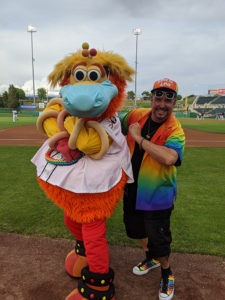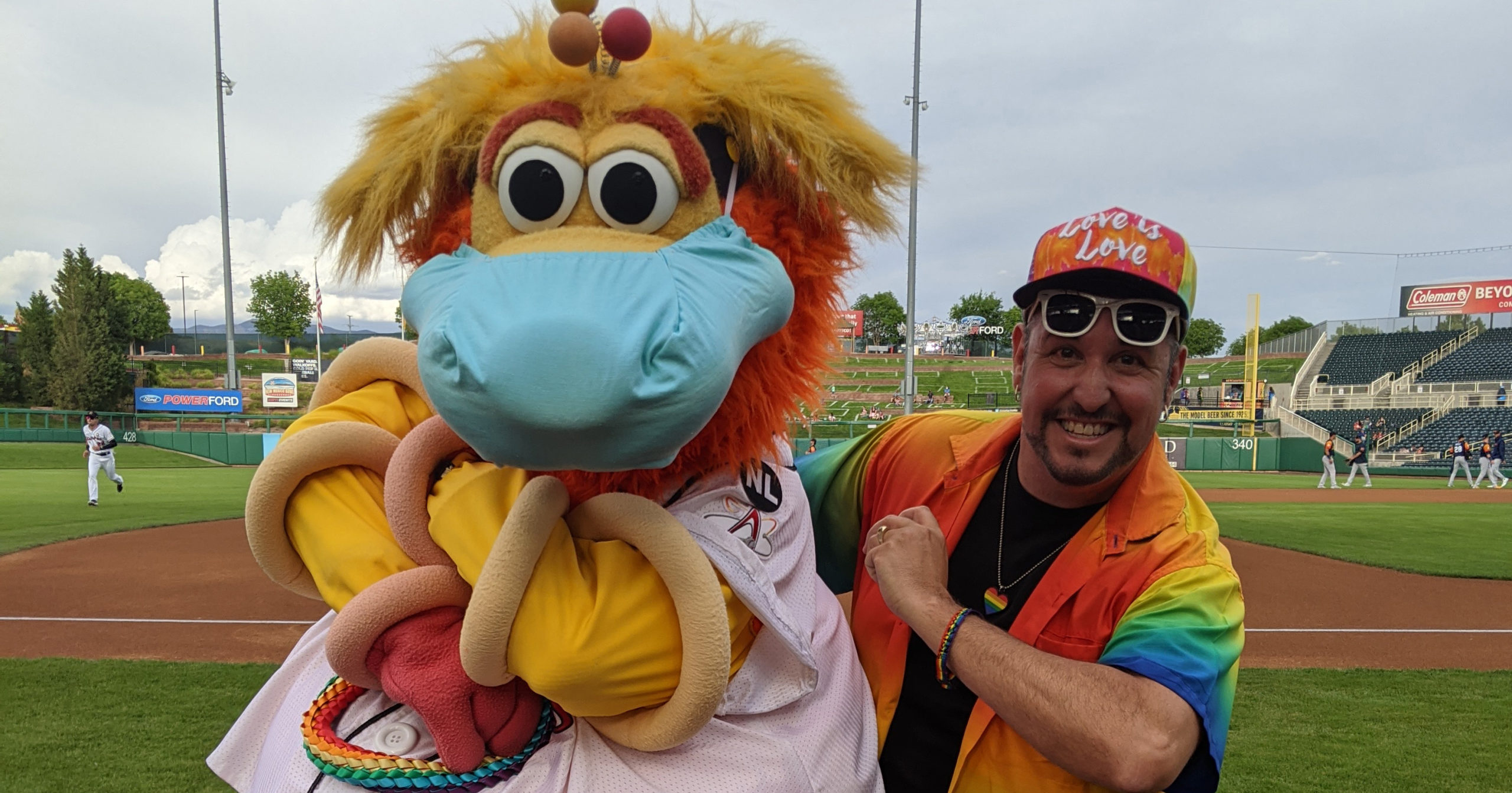
PJ Sedillo, an associate professor of special education at New Mexico Highlands University, poses for a photo with Orbit, the Albuquerque Isotopes Baseball Club’s mascot.
Las Vegas, NM – As PJ Sedillo stood on the pitcher’s mound, he was “scared as heck.” All eyes, it seemed, were on him as Sedillo held the baseball in his hand, ready to make the first pitch in the minor-league matchup between the Albuquerque Isotopes and the Las Vegas, Nevada Aviators.
There was a time many years ago that Sedillo would have avoided the kind of attention that came along with a ceremonial pitch in front of a stadium of fans. There was a time that fear made Sedillo hide in a corner, afraid that if the world knew who he was, he could lose his job.
Or worse.
As Sedillo, an associate professor of special education at New Mexico Highlands University, wound up the pitch on that cloudy June evening, his apprehension and fear were different.
“I hadn’t thrown a ball since I was in elementary school,” Sedillo said. “I said a little prayer that the ball would actually reach the catcher; not a strike, but still making it to the catcher’s mitt.”
That evening, Sedillo didn’t have to hide who he was. It was the reason he was there, throwing out the ceremonial first pitch for the Albuquerque Isotope’s June 3 Pride Night.
“Electing PJ to throw out the first pitch was a no-brainer,” said Dylan Storm, the Albuquerque Isotopes Baseball Club’s marketing and promotions manager. “He’s been such an influential ambassador for human rights and has such a pedigree for affecting change within the LGBT community. The Isotopes couldn’t ask for a better individual.”
For Sedillo, advocacy was something he didn’t seek out when he was younger. When he was a student earning his bachelor’s degree at Highlands in the 80’s, Sedillo didn’t dare reveal he was gay.
“I had come out to my friends and family when I was about 15,” Sedillo said. “I went back in the closet for my safety when I attended NMHU. At that time, it was very dangerous to let others know that you were gay.”
Sedillo graduated from Highlands in 1989 and began working for Albuquerque Public Schools, a career where Sedillo felt he needed to remain in the closet.
“It was at one pride rally that I saw the news with their cameras and hid in the corner,” Sedillo said. “I did not know if I could be fired for being a gay elementary school teacher.”
His fears were well founded. Even after the Supreme Court established a constitutional right to gay marriage in 2019, people could still be fired from their jobs for being gay in more than half of the U.S. states.
When Sedillo arrived home after hiding from the news cameras, he was distraught. It changed his life.
“I had a metamorphosis and felt strongly that I would never hide who I am to anyone,” he said. “That’s when my advocacy began.”
One of Sedillo’s first campaigns was to create a non-discrimination policy for all Albuquerque Public School teachers, working closely with his mentor, Neil Isbin, a human-rights activist who died of AIDS at 46. They were successful in obtaining wording for non-discrimination against sexual orientation for all APS teachers’ contracts.
PJ Sedillo and his spouse Tony Ross met in 1993 when they were introduced by a friend. “We hit it off and by October, we had bought a home and built it from scratch,” Sedillo said. The two married in Canada, since their union was not yet legal in the United States. Sedillo and Ross took the school district to court for discrimination when the district did not provide Tony Ross, full spousal benefits. Successfully they obtained these benefits which were first to be offered to a same-sex couple in the United States.
“We hit it off and by October, we had bought a home and built it from scratch,” Sedillo said. The two married in Canada, since their union was not yet legal in the United States.
Outside their home, the world was still a dangerous place for the GLBTQ community. Five years after Sedillo and Ross met, news of a murder swept the country.
While riding his bicycle, Aaron Kreifels saw Matthew Shepard, a student at the University of Wyoming, tied to a barbed wire fence. Initially thinking the 21-year-old was a scarecrow, Kreifels soon discovered the grisly truth. Shepard, beaten so severely that his face was covered in blood, was barely hanging onto life. Shepard died from his injuries six days later. The suspects, Aaron McKinney and Russell Henderson’s defense argued the two men only planned to rob Shepard, but killed him in a fit of rage, saying Shepard made sexual advances towards them.
While Shepard’s death prompted federal hate crime legislation, it also saw an eruption of anti-gay sentiment, most visibly the Westboro Baptist Church, which picketed Shepard’s funeral with signs bearing homophobic slogans.
Sedillo said he feels attitudes regarding the GLBTQ community has changed in the years since.
“There is more acceptance because almost everyone has a story that they now know someone who is GLBTQ,” Sedillo said. “We have come out of our closets and have put a face to who we are.
“Although our community has made great positive strides, we as a community sometimes still live in fear,” Sedillo said, noting there is still no federal law that protects GLBTQ individuals from being fired, denied housing and a multiple of discrimination policies that still exist in many states and globally there are countries that kill individuals simply because they are GLBTQ.
“Many assumptions are made about people,” Sedillo said. “For example, I wear a wedding ring and those who see it automatically assume that I have a wife. When people ask me that question, I have to see if the situation is right to say, ‘no I don’t have a wife I have a husband.’ It is at that moment that I am coming out to another human being, and it is that coming out that occurs on a daily basis. I speak up because I want to give a voice to all of those who are still hiding behind the walls not letting those see their whole being.”
Looking back, Sedillo said he would tell his younger self to be proud of who he is and do not give anyone the power to define himself.
“God took the time to make me as a proud gay, Hispanic male,” Sedillo said. “It is now second nature, and I proudly share that I have a husband. The statement that I am gay rarely comes up because my life has become an open book.
“A lot has changed since I was that young student living in Archuleta Hall, hiding who I was,” said Sedillo, who continued on to receive his master’s and doctorate degrees in special and gifted education at the University of New Mexico. “I had very few friends that actually knew about me. It is very wonderful that my life has become full circle as an associate professor at NMHU. I have been able to introduce Safe Zone Training and assisted with the first Pride in Las Vegas, New Mexico. It is no secret any more about my sexual orientation and students, staff, faculty, and administration have all welcomed me with open arms.”
Sedillo is now an at-large board member for the National Association for Gifted Children and is an expert in the field of GLBTQ-gifted individuals with an emphasis on risk and resiliency.
Sedillo’s ceremonial pitch did what he hoped it would do, make it all the way to the catcher’s mitt.
“I did it,” he thought, leaving the pitcher’s mound smiling, knowing he had become a voice and mentor for many spectators in the stand and along his life’s journey.

